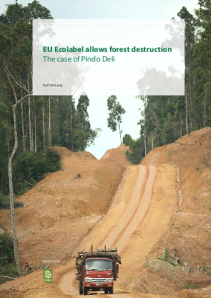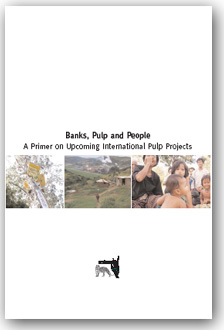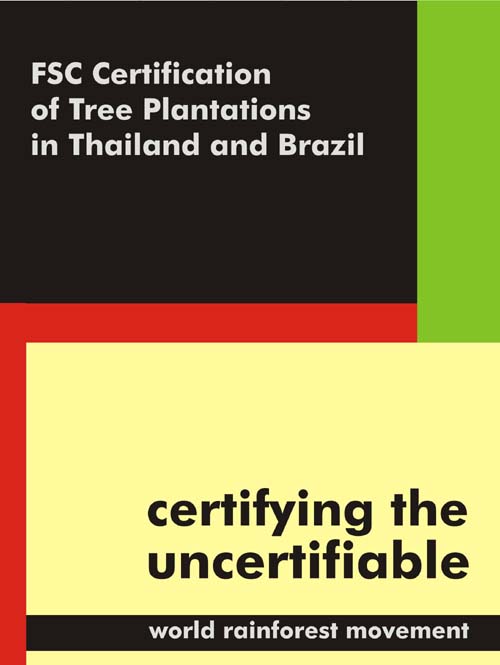The European Investment Bank has given two loans to the Aracruz-Stora Enso joint venture Veracel pulp mill in Brazil. The Bank ignored the impacts on employment, local people and their environment.
By Chris Lang. Published as a case study in The European Investment Bank in the South. In whose interest? by Jaroslava Colajacomo, published by CRBM, CEE Bankwatch Network, Friends of the Earth International and WEED, February 2006.
In June 2005, a massive new pulp mill started operations near Eunápolis in the state of Bahia in Brazil. Built with financing from the EIB, the Nordic Investment Bank and Brazil’s development bank, BNDES, the 900,000 tonnes a year Veracel pulp mill is the largest single line pulp mill in the world. The total cost of the project, including plantations and infrastructure, was US$1.25 billion.[1] The EIB has approved two loans to Veracel: US$30 million in 2001 for plantations, forestry equipment, and building and upgrading roads;[2] and US$80 million in 2003 for the pulp mill construction.[3] Veracel is a joint venture between the world’s largest paper producer, Stora Enso (Finland-Sweden), and the world’s largest producer of bleached eucalyptus pulp, Aracruz (Brazil). Pulp from the mill is to be exported, mainly to Europe, the USA and Asia.

Veracel’s pulp mill, Bahia, Brazil. Built at a total cost of US$1.25 billion, the pulp mill provides 400 jobs. In total the company employs only 2,000 people.
The Veracel project led to a series of lucrative contracts for European companies (or their subsidiaries), including Jaakko Pöyry (Finland), Andritz (Austria), Eka Chemicals (Sweden), Degussa (Germany), Aker Kvaerner (Norway), Metso Corporation (Finland), Partek Forest (Finland) and Norsul (part of Norway’s Lorentzen Group which owns 28 per cent of shares in Aracruz).
The EIB’s process for approving the pulp mill loan was not transparent. At a meeting with EIB staff in Brussels in 2003, Marcelo Calazans from the Brazilian NGO FASE asked to see the documents that the EIB produced during its evaluation of the Veracel project. EIB staff replied that none of its documents about Veracel were available to the public. They also declined to release the date when the EIB Board would meet to discuss the Veracel loan.[4]
While the benefits to European corporations are clear, the benefits for local people in Bahia are not.
Impacts on land rights and livelihoods
Veracel’s vast area of plantations exacerbates the problem of land concentration, in a country where large numbers of rural people either have no land or too little land from which to earn a livelihood. Veracel owns 147,000 hectares of land, of which 70,000 hectares is plantations. In addition, Veracel has contracts with farmers to grow eucalyptus on an area covering a total of 23,000 hectares.[5] Veracel bought much of this land from large landowners, many of them cattle ranchers. Nonetheless, more than 800 people had to leave their homes to make way for Veracel’s operations.[6] José Koopmans, a priest and human rights activist in the south of Bahia, states that at least one-eighth of the land that Veracel bought was previously used for small-scale agriculture. In 2003, researchers from SwedWatch, a Swedish NGO, interviewed farmers living near Veracel’s plantations. They said that the water level in creeks, ponds and lakes was significantly lower than before Veracel started planting. In some cases, watercourses had completely disappeared. Fishing and irrigation of agricultural farmland became impossible.[7]

“There are no jobs here now and no money from the eucalyptus,” said a villager living near Veracel’s plantations.
After agreeing to the loan for the construction of the pulp mill, the EIB announced that Veracel’s pulp mill “is expected to create significant economic benefits for the region, including employment”.[8] In fact, Veracel’s pulp mill will employ only 400 people.[9]
Unemployment is the main problem caused by the four pulp and paper mills in the southern part of Bahia, according to Melquiades Spinola, of the Centre of Studies and Research for the Development of the Extreme South (CEPEDES), a Bahia-based NGO. Pulp mills and plantations provide very few jobs, but they remove very large numbers of people from the land, causing unemployment. While vast sums of money are invested in pulp mills, “there are 12,000 families of (landless) peasants living in camps along the roadsides,” says Spinola.[10]
Impacts on the environment
The EIB claims that Veracel’s operations “will help to reverse tropical rain forest destruction, to reduce the pressure for logging on natural forests and to maintain biodiversity.”[11] The EIB appears to have forgotten Veracel’s record. In February 1993, the Brazilian authorities temporarily suspended its operations after local NGOs and the Union of Forestry Workers documented how the company was clearing the Atlantic Forest (Mata Atlântica) to make way for its tree plantations.[12]
Veracel acknowledges that it cleared 64 hectares of forest in 1993. “That was the only time in Veracel’s history when it acted against good environmental practice,” according to Veracel’s Vitor da Costa.[13] But in 2003, researchers from SwedWatch photographed an area where Veracel had again cleared forest to make way for a timber standing area. In December 2003, officials from the federal environmental bureau IBAMA pointed out that a large area of Mata Atlântica had been logged. The area was being planted with eucalyptus for Veracel, under the company’s farmer contract planting scheme.[14]
Veracel runs a forest conservation area called Veracruz Station which covers 6,000 hectares of the land that Veracel bought for its plantation operations in the south of Bahia state. In fact, Veracel would be in breach of Brazilian law if it did anything other than protect this area of forest.[15]
In April 2004, about 2,000 families from Brazil’s Landless Workers Movement (MST – Movimento dos Trabalhadores Rurais Sem Terra) occupied 25 hectares of land and cut down four hectares of Veracel’s eucalyptus trees. “Nobody eats eucalyptus,” they shouted as they occupied the land and started planting corn, manioc and beans.[16]
After five days, the MST decided to avoid what would probably have been a violent confrontation with the state police and left the land, accepting promises from the federal government that land reform would be accelerated in the region. Six months later another protest against Veracel took place. This time, 300 indigenous Pataxó blocked the BR-101 highway for 19 hours to protest against the fact that Veracel had planted eucalyptus on their traditional lands.
Despite the problems, Veracel has plans to expand.[17] If the mill expands, the area of plantations will also need to expand. Problems of land rights will only be exacerbated.
References:
[1] Måns Andersson and Örjan Bartholdson Swedish Pulp in Brazil: The case of Veracel, Swedwatch, 2004, page 5.
[2] EIB loan for reforestation in Brazil, EIB press release, 18 October 2001.
[3] Veracel Pulp Mill Project, Brazil, European Investment Bank, press release, 30 March 2004.
[4] Chris Lang, the author of this section on Veracel, was present at the meeting at the EIB office in Brussels.
[5] Plantations, Veracel web-site.
[6] Alacir De’Nadai, Winifridus Overbeek and Luiz Alberto Soares (2005) Promises of jobs and destruction of work: The case of Aracruz Cellulose in Brazil, World Rainforest Movement, Uruguay, page 37.
[7] Måns Andersson and Örjan Bartholdson Swedish Pulp in Brazil: The case of Veracel, Swedwatch, 2004, page 22.
[8] Veracel Pulp Mill Project, Brazil, European Investment Bank, press release, 30 March 2004.
[9] Veracel 10 years, Veracel company booklet, 2002.
[10] Gustavo Gonzales, “South America: Profitable Pulp Mills Also Pollute”, Inter Press Service, 13 April 2005.
[11] EIB loan for reforestation in Brazil, EIB press release, 18 October 2001.
[12] Brazil: The short memory of Veracel and the power of Aracruz, World Rainforest Movement bulletin no. 39, October 2000.
[13] Hannu Pesonen, “Right as rain forest”, Tempus, Stora Enso Quarterly Magazine, 1, 2004.
[14] Måns Andersson and Örjan Bartholdson Swedish Pulp in Brazil: The case of Veracel, Swedwatch, 2004, page 33.
[15] Brazil: The short memory of Veracel and the power of Aracruz, World Rainforest Movement bulletin no. 39, October 2000.
[16] Raymond Colitt, “Brazil’s landless in widespread protests”, Financial Times, 7 April 2004.
[17] Stora Enso is exploring the possibility of building a new fibre line at Veracel, Stora Enso press release, 28 September 2005.









